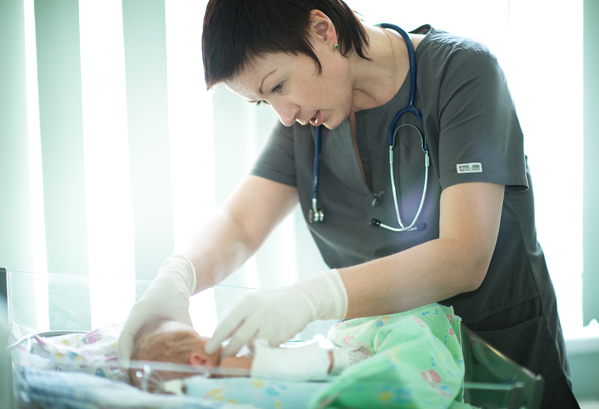FSBI «National Medical
Research Center for Obstetrics, Gynecology
and Perinatology named after Academician V.I.Kulakov»
Ministry of Health of the Russian Federation
Department of Neonatal Surgery
Department of Neonatal Surgery
Head of the Department: Yulia Podurovskaya, Ph.D. in Medicine, pediatric surgeon, member of the Russian Society of Neonatologists
E-mail: y_podurovskaya@oparina4.ru
ABOUT THE DEPARTMENT
The Department has been functioning since 2003. Nowadays, the Department provides a full scope of diagnostics and treatment of babies with congenital malformations of different types of severity. The doctors do their upmost to preserve lives and health of little patients, giving hope for future.
Every year more than 200 patients with congenital pathologies get treatment in the Department. About 80% of them undergo surgery. In especially severe and critical conditions in newborns with malformations, extracorporeal membrane oxygenation (ECMO) is used.
Admission to hospital is made according to the decision of prenatal consilium by multidisciplinary team of obstetrician-gynecologist, geneticist, ultrasound diagnostician and neonatal surgeon.
The operating theater is located in the Department, i.e. there is no negative impact of transportation of the babies to the surgical block and back, and this reduces the risk of infections and complications in the intra- and postoperative period. After surgery, the baby stays in the intensive care room and followed-up by the anesthesiologists-resuscitators.

FOCUS AREA
- Health care for the babies with congenital anomalies
- Genetic counseling
- Birth support
- Surgical treatment of newborns with the use of minimally invasive endoscopy
- Intensive therapy and postoperative care
SERVICES
- Prenatal diagnostics of congenital malformations;
- Management of pregnant women with malformations in their fetuses in one of the Departments of the Center depending on the specificity of fetal malformation and subsequent delivery;
- Laboratory and instrumental examination of a newborn "on site";
- Emergent surgery to correct congenital malformations;
- Neonatological care considering the severity of malformations;
- Emergent cardiac care
EMERGENCY SURGERY
Emergent surgery after short preoperative preparation and stabilization of the patient’s state:
- embryonic hernia (omphalocele);
- gastroschisis;
- esophageal atresia;
- congenital intestinal obstruction;
- congenital diaphragmatic hernia;
- cystic malformation of the lung with symptoms of respiratory failure;
- complicated tumors and masses of any location (e.g. ovarioan torsion or rupture)
DELAYED SURGERY
The diseases requesting delayed surgical treatment after the use of additional methods of diagnostics:
- abdominal masses;
- multicystic kidney disease;
- megaureter;
- hydronephrosis;
- billary atresia;
- bulky formations of various localization (teratomas, lymphangiomas, etc.);
- lung adenomatosis;
- lung sequestration
CESAREAN SECTION
Fetal pathology requesting cesarean section:
- large teratomas;
- large embryonic hernias;
- large lymphangiomas;
- gastroschisis
TECHNIQUES AND TECHNOLOGIES
In neonatal surgery:
- endoscopic correction of congenital malformations and surgical diseases in the newborns;
- side-to-side/end-to-side anastomosis for congenital anomalies and the diseases of digestive system;
- plastic surgery of diaphragm defects and thoracoscopy with the use of synthetic materials for congenital diaphragmatic hernias in newborns;
- anterior abdominal wall plasty in newborns with gastroschisis and omphalocele;
- lobectomy;
- nephrectomy, ureter neoimplantation;
- heminephrureterectomy;
- endoscopic bougienage and stenting of the ureteral orifice;
- bladder plastic surgery with local tissues;
- uretero-ileo-sigmoidostomy;
- laparoscopic nephroureterectomy
In pediatric cardiology:
- one-step correction of surgical and cardiosurgical pathology in the newborns with concomitant pathologies;
- resection of critical coarctation of the aorta;
- clipping of patent ductus arteriosus in patients with extremely low and very low body weight
In neonatal anesthesiology and resuscitation:
- individual selection of fluid, cardiotonic, vasotropic and respiratory therapy, Doppler blood flow assessment, MRI and CT, immunological and neonatal molecular genetic testing for malformations in the perioperative period;
- extracorporeal membrane oxygenation in newborns with critical respiratory failure in the preoperative and postoperative period;
- peritoneal dialysis, hemodialysis, ultrafiltration in newborns with acute renal failure;
- high-frequency oscillatory mechanical ventilation intraoperatively in infants with severe respiratory failure;
- targeted therapy of pulmonary arterial hypertension in newborns with the use of inhalation of nitric oxide (II) and prostacyclins, phosphodiesterase type 5 inhibitors and endothelin receptor antagonists;
- multimodal pain management;
- regional analgesia techniques (epidural, caudal analgesia) in the newborns in the postoperative period;
- correction of intra- and postoperative anemia by transfusion of auto-umbilical cord blood components in newborns;
- personalized instrumental monitoring of oxygenation parameters and main vital parameters including cerebral oximetry;
- mass spectrometry to detect the pathogens of infectious and inflammatory disorders in the newborns with malformations, and real time PCR to determine targeted antibacterial and antimycotic therapy in the perioperative period
In pediatrics
- cytogenetic tests and gene sequencing for malformations in the newborns;
- personalized nutrition therapy of the newborns with malformations in the preoperative and postoperative period.





